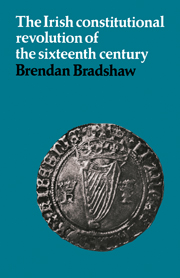Book contents
- Frontmatter
- Contents
- Dedication
- Preface
- Abbreviations
- Ireland about 1530
- PART I ‘A discourse of the cause of the evil state of Ireland and of the remedies thereof’
- PART II The reform of the Lordship in the era of Thomas Cromwell, 1530–40
- PART III The liberal revolution
- Introduction
- 7 The reform of the Irishry
- 8 The transformation of the Lordship
- 9 The origins of Irish political nationalism
- Bibliography
- Index
9 - The origins of Irish political nationalism
Published online by Cambridge University Press: 07 October 2011
- Frontmatter
- Contents
- Dedication
- Preface
- Abbreviations
- Ireland about 1530
- PART I ‘A discourse of the cause of the evil state of Ireland and of the remedies thereof’
- PART II The reform of the Lordship in the era of Thomas Cromwell, 1530–40
- PART III The liberal revolution
- Introduction
- 7 The reform of the Irishry
- 8 The transformation of the Lordship
- 9 The origins of Irish political nationalism
- Bibliography
- Index
Summary
The abandonment of conciliation
Tragically, the days of‘truth and gentleness’ were numbered. St Leger succeeded in vindicating his policy in England and returned to Ireland at the end of 1546 to revitalise the programme which had been forced into passivity by external pressures at the end of 1543. However, while the battle for conciliation was being won in England, the war was being lost in Ireland. In St Leger's absence William Brabazon assumed control of the administration and, in conformity with his extreme radical proclivities, proceeded to blast the fragile shoots that had come forth in the spring of the liberal initiative. St Leger returned to find O'Connor and O'More in open war, goaded by the provocation of Brabazon. The relationship of cooperation and trust between government and local leaders, so patiently built up over the previous six years, had been sabotaged.
St Leger might have saved the situation as he had done twice before, in 1540, and again in 1544 when a similar though less serious situation had developed in his absence. But the fate of the liberal initiative was sealed by the death of Henry VIII at the end of January 1547, within a month of the lord deputy's return. This study has devoted some space to demonstrating that the commonwealth liberalism of the 1540s was significantly different from the royal liberalism of the 1520s, and that Henry VIII accepted the later policy with considerable reluctance. Yet when it came to the point he was amenable. Despite the tantrums and the rantings St Leger never quite lost the king's confidence or his support.
- Type
- Chapter
- Information
- The Irish Constitutional Revolution of the Sixteenth Century , pp. 258 - 288Publisher: Cambridge University PressPrint publication year: 1979



